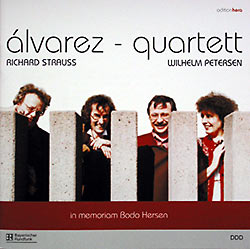

 |
 |
|

Strauss, Pedersen Piano Quartets Richard Strauss Piano Quartet Op 13; 4 pieces Alvarez Piano Quartet Hera 02121
The single most illuminating sentence ever written about Brahms tells us he made music from the openly expressed regret he was born too late. To a lesser extent, this is true of all late Romanticism, which elaborated themes of nostalgia, regret, resignation and despair. With the young Strauss, and the late Perdersen, as well as from some recent discs reviewed in these pages – Stanford and Koessler’s chamber music, for example, we sometimes seem to encounter something much more specific – composers making music from the openly expressed regret they were not Brahms. Strauss’ chamber works, of which his violin sonata Op 18 is the least neglected, date from the beginning of his compositional life. When he wrote this piano quartet, Brahms had not yet written even the last of the violin sonatas, nor Dvorak his Piano Quartet Op 87. So this sounds like a mid-romantic work, and yet another illustration that when people say post-Brahmsian, they usually mean post-Schumann. The scherzo, in particular, is a gem of a movement, and also very reminiscent of the equivalent movement in both the Schumann Piano Quintet and the same composer's Op 41/ 1 string quartet. Pedersen, who was prominent in the musical life of Munich, and had his Great Mass premiered by Karl Boehm in 1930, only became a reactionary near the end of his life, later than his Op 6 violin sonata, which became reworked as this piano quartet. Was he influenced by the senselessness of the Second World War into thinking that progress was an illusion? So though this work is, again, full of yearning and unfulfilment, it has a wistful feel more reminiscent of late Faure. These are excellent performances. Piazzini has a deserved and considerable reputation as a soloist; the string players are perfectly integrated into the texture, notably the felicitously-named Peter Wolf (only one ‘o’). Werner Grobholz adapts his tone expertly for the 'piano chamber' sound. Sadly, the viola player, Bodo Hersen, died unexpectedly between recording and issue. The CDs are dedicated to him. Nostalgia? We are patterned by it still, even in something as seemingly remote as holidays. Based on the anthropologists’ trope of visiting a hitherto undiscovered tribe, and being the last to see it before it falls under the axe of civilisation, we are all on the hunt for that “unspoilt holiday spot,” that “best-kept secret,” which will make it into the year after next’s Rough Guide. This is a fine recording, immaculately presented (though the two discs add up only to 90 minutes). And these pieces do not deserve to be secrets, well-kept or otherwise. Recommended. Ying Chang See also reviews of Stanford and Koessler chamber works
|